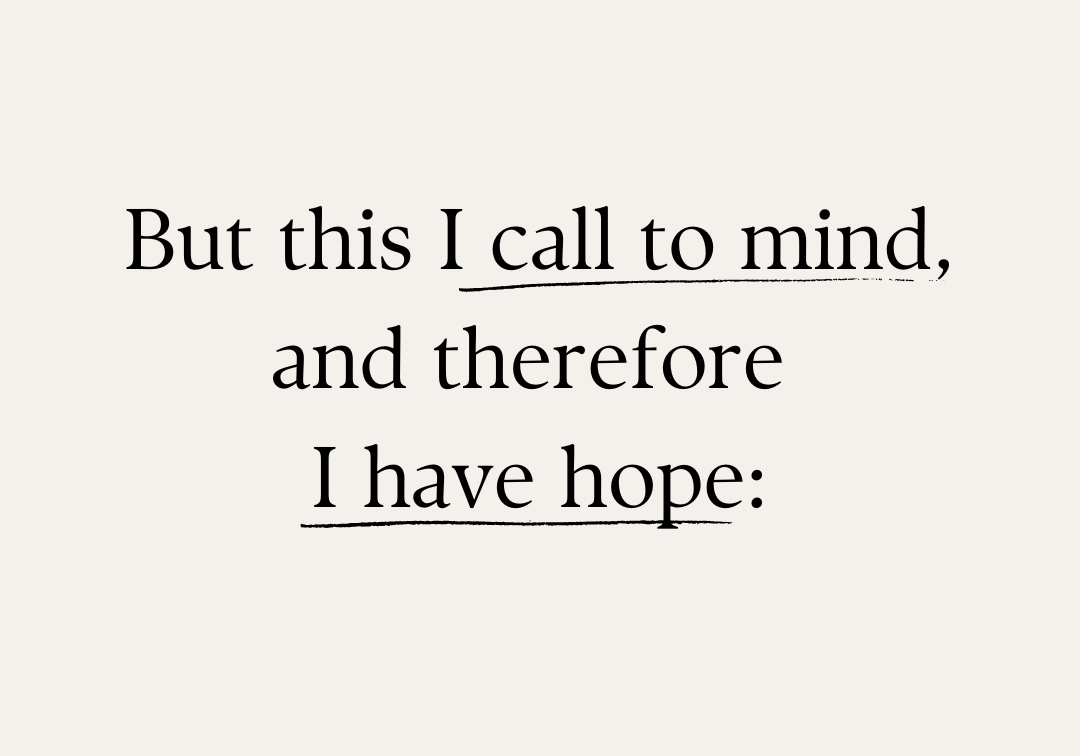Jeremiah begins Lamentations Chapter 3 with this honest truth:
"I am the man who has seen affliction"......
Can you relate? I know there are many seasons where I could vehemently say, "I am the woman who has seen affliction!"
In Lamentations, the prophet Jeremiah was greatly afflicted because God's people were experiencing God's wrath due to their idolatry and lack of repentance. In verses 2-20, he recounts and laments the details and depths of his suffering.
This reminds us that it's okay to tell God exactly how we feel about the affliction He allows in our lives or those of the people we love.
Do you need to pour out your heart and lament to God now?

Lamentations 3:21
"BUT THIS"-
When pain and suffering threatened to take Jeremiah into the depths of despair, he paused to recall the truth about who God is: "but this I call to mind." Recalling the truth about God's character was the only path back to the hope he had lost in verse 18: "my endurance has perished; so has my hope from the Lord." Friend, recalling is our path back to hope too!
This shift in his thinking doesn't mean that verses 2-20 are no longer valid.
It's both/and.
Life can be devastating and downright confusing, but God is still who He claims to be and is still actively working on our behalf.
What attributes of God bring comfort and hope to your heart?
Lamentations 3:22a
"Hesed"
"Steadfast love" doesn't fully capture the meaning behind the Hebrew word "hesed."
"Hesed" is an essential attribute of God used to convey the actions God takes in loving his people; no single word in English fully captures the meaning. We find steadfast love, compassion, mercy, goodness, forgiveness, lovingkindness, and grace used to convey the meaning throughout the Bible.

The tone of Jeremiah's thinking shifted as he recalled God's enduring, covenant love; a love that is consistently extended and placed on underserving people.
Nothing we go through can separate us from this love (Romans 8:38)! Even God's discipline is evidence of His love in action meant to lead us back to Himself.
Sweet friend, if your circumstances make you wonder if God's love for you is on pause, remember that "hesed" is God's covenant love in action-it's ever present and actively pursuing us; it never ends.
Will you ask God to help you fully know and rest in His steadfast love for you?

Lamentations 3:22b
The Hebrew word for "mercies" is "rachamim," which is derived from the Hebrew word for "womb." It implies the instinctive nurturing love a mother has for her child.
God's mercies are plural and inexhaustible, pouring over His children like a river that never runs dry. The mercy I feel toward others runs dry quickly, especially when I'm trying to get three young boys out the door for school each morning, but God's mercies towards His children never end. He doesn't get depleted, exhausted, or irritated when dealing with us.
How have you experienced God's nurturing comfort, and compassion amid hardship?
Lamentations 3:23
A fresh supply of God's mercies awaits us every morning because God's character is unchanging. Loving, merciful, and faithful is who God is, and His character is never dependent on anything we do.
I love this quote from Spurgeon:
"God has not forgotten us. The very breath in our nostrils is a proof of his goodness to us; let us, therefore, dear friends, still hope for yet further favors from him."

Sweet friend, we can look forward to daily renewal, no matter what happened the day before. God's mercies are fresh; His steadfast love is pursuing and working for our good and His glory. It's just who God is! He is faithful to His character and to His children.
Our complaints may not be the same as the weeping prophet's, but the way up from despair and darkness is the same. Lamenting what hurts and recalling God's character is the pathway to renewed hope. And when you and I fail to grasp these truths and go to bed in despair-praise God! We can try again in the morning-His mercy is new!



Be the first to comment